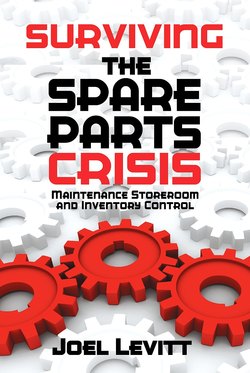Читать книгу Surviving the Spare Parts Crisis - Joel Levitt - Страница 5
На сайте Литреса книга снята с продажи.
ОглавлениеTABLE OF CONTENTS
Introduction
Preface
Acknowledgments
About the Author
1 What Are We Really Doing?
Mission
Parts Are the Pointer to the Maintenance Problems
Management of Change in the Stores Organization
Service Agreement from the Warehouse to the Maintenance Department or “What Maintenance Expects from Material Control”
Why Bother Managing the Storeroom?
Reality Check on the Nature of OEMs and Their Parts Businesses
The Dimensions of the Spare Parts Crisis
Why Do Parts Stock Out Anyway?
2 Models of Inventory
Retail and Resale Inventory Model (Finished Goods, Too)
Finished Goods
Orphan Inventory: Companies with Physical Assets that Wear Out
Maintenance Inventory Usages
Another View Based on the Consumption Rate of the Part
3 Modern Production Gives Us the Tools for Maintenance Planning
The Miracle of Modern Production
Timing and Trust Are Everything
Where Did This All Come From? Let's Revisit Ford and His Model T
What It Takes Day In and Day Out
Same Logic But Different Application
Reactive Versus Proactive Parts Requirements
Buffer Stock
4 Perspectives on Storerooms
POV (Point of View) Impacts How People View the Storeroom
Misalignment of Accountability and Realignment of Accountability
Common Comments about Good and Bad Storerooms
5 How Well Do You Know Your Current Stores Operation?
How to Evaluate Your Storeroom in an Hour (or Two)
Storeroom Management Questionaire
6 Spare Parts Inventory and Risk Management
Risk Management Functions
Risk Management Options
What Is the Risk in Risk Management?
Risk Management Process in Depth
Think of Your Inventory Items as Insurance Policies
Investment Versus Risk Management
Eliminate the Condition and You Eliminate the Risk
Emotionally Driven Inventory is Not the Solution
7 What the Storeroom Needs to Know about Maintenance
Machines Break
Maintenance Policy Leads to the Stocking Policy
The Product of Maintenance Is Reliable Capacity
8 The Big Picture: Where the Maintenance Warehouse Fits
ISO 55000 Asset Management Programs
Purchasing MRO Spare Parts
9 Storeroom Management
Business Processes and the Storeroom
Warehouse Management Activities
Kitting
How Do We Get Accurate Records?
10 Computerization
Inventory Computer System: A Project
Bill of Materials (BOM)
Building the Parts Files in the CMMS
The Parts Catalogs
Rules of a Computer-Aided Maintenance Storeroom
11 The Physical Storeroom
Functions of the Physical Storeroom
Where to Locate the Storeroom
Sizing the Storeroom
Care and Feeding of Spare Parts
Hazardous Materials Management
Storeroom Layout Strategies
How to Conduct a Physical Inventory
5S and Your Storeroom
Hoarding and Pirating of Inventory
12 The Economic Storeroom
Accounting for Spare Parts
Types of Demand
Different Models to Accommodate Demand
Carrying Costs
Economic Analysis: Big Ticket Analysis
Obsolete Parts and Gross Overstock
Managing Inventory Turns
The Call for Lean
How Service Level Contributes to the Spare Parts Crisis
Lead Time
Cost of Stocking or Procurement (Also Known as Cost of Acquisition)
13 SIC (Statistical Inventory Control)
Calculating Safety Stock
Economic Order Quantity (EOQ)
Additional SIC Formulas
14 Dealing with the Part Itself
Evaluation of Parts the First Time Around
Parts Interchange
Machine and Part Criticality
Warranty Recovery for Parts
Know Your ABCs: Segmenting Your Inventory for Analysis
Time to Failure
Reverse Engineering
Counterfeit Spare Parts
Cost of the Failure of Failure Analysis
15 Parts as a Business : E-MRO
The Internet and Savings
Maintenance Distributors
The Law: Uniform Commercial Code (UCC)
Vendors
Other Strategies
16 Parts: Replace-Rebuild-Remanufacture-Used
Replace
Rebuild
Remanufacture
Used
Remanufacture versus Replacement of Entire Machines
17 Metrics and KPIs for the Maintenance Warehouse
Performance Metrics
The SMART Technique
Why Measure?
Warehouse Metrics
Parts Metrics
Metrics for All of Maintenance
18 Bright Future for the Spares Business
Internet-Based Sourcing
3D Printing
Glossary
Bibliography
Index
